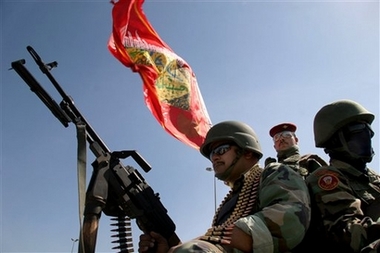9 US soldiers killed in Iraq bombing
(AP)Updated: 2007-03-06 16:26
BAGHDAD, Iraq - Nine US soldiers died in two separate incidents north of Baghdad, the military said Tuesday.
 Iraqi army soldiers oversee pilgrims as they enter Karbala, 80 kilometers (50 miles) south of Baghdad, Iraq, Monday, March 5, 2007. [AP]  |
In another incident the same day, three more soldiers were killed by a roadside bomb in Diyala province, another statement said. One soldier was wounded.
All nine were assigned to Task Force Lightning. Names were withheld pending family notification.
Also Tuesday, Shiite pilgrims came under attack again, police said, with at least three killed as they streamed south from Baghdad on foot.
Worshippers were heading to Karbala, 50 miles south of the Iraqi capital, ahead of a Muslim holiday this weekend that marks the end of a 40-day mourning period after the death of the Prophet Muhammad's grandson.
There were at least three shootings and one bomb attack against groups of pilgrims making the journey Tuesday.
Gunmen opened fire on pilgrims in two separate incidents in Latifiyah, 20 miles south of Baghdad, police said. Three people were killed and at least nine hurt, they said.
Five others were wounded in attacks across southern Baghdad, police said. Earlier, a roadside bomb exploded near a police convoy south of Baghdad, killing a commander and wounding four guards, police said.
On Monday a suicide car bomber turned a venerable book market into a deadly inferno and gunmen targeted Shiite pilgrims as suspected Sunni insurgents brought major bloodshed back into the lap of their main Shiite rivals. At least 38 people died in the blast and seven pilgrims were killed.
The violence - after a relative three-day lull in Baghdad - was seen as another salvo in the Sunni extremist campaign to provoke a sectarian civil war that could tear apart the Shiite-led government and erase Washington's plans for Iraq.
The Shiite Mahdi Army militia has so far resisted full-scale retaliation through a combination of self-interest and intense government pressure. But the militia's leader, the radical cleric Muqtada al-Sadr, is now being cornered in new ways that have put him on the defensive.
An expected Cabinet reshuffle could take a serious bite out of al-Sadr's voice in government - a move strongly encouraged by Washington.
Al-Sadr also opened the door for US and Iraqi troops to enter the Mahdi stronghold of Sadr City in Baghdad - under a painstaking deal with authorities - but his loyalists are still being hunted outside the capital.
"Al-Sadr and his forces could be feeling under siege," said Alireza Nourizadeh, chief researcher at the London-based Center for Arab-Iranian Studies. "That makes them less predictable. That means they are more dangerous."
One possible sign of brewing troubles was 30 bullet-ridden bodies found across Baghdad. Many of those killings are blamed on Shiite death squads, and Monday's figure was the highest in weeks.
And the Sunni extremists keep pressing.
The suicide mission tore through booksellers and other stores on narrow Mutanabi Street, a mostly Shiite-run commercial area in Baghdad's historical heart along the Tigris River.
Within seconds, flames engulfed open-air stalls and shops brimming with books and magazines. Gas-powered generators - needed because of frequent power cuts - exploded one by one.
Bloodstained pages that escaped the fire were carried away in a wind-whipped pillar of black smoke.
Firefighters had to spray huge arches of water from blocks away because their
trucks were took large for the warren of lanes in old Baghdad. At least 38
people died and 105 were injured, said Raad Jabar, a Health Ministry official.
| 1 | 2 |  |
|
||
|
||
|
|

